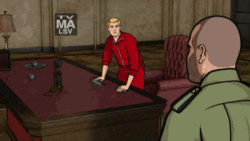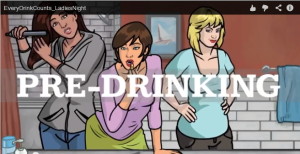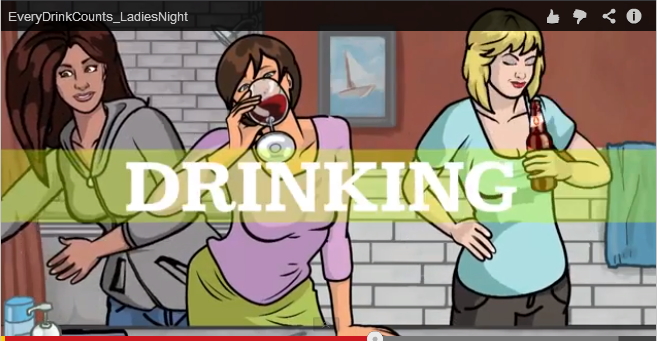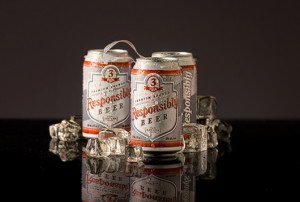So a recurring issue for writers everywhere is making sure that your audience actually likes the characters they’re supposed to like. I know that’s something I struggle with. Try to make your protagonist too awesome, and your audience may turn against them on general principle. By way of a for instance, a friend once wrote a doomed love story between a party-loving bachelor and a married woman, which resulted in me saying “He’s brilliant at everything he does, speaks four languages, everyone clearly loves him… and it’s not enough? I’m supposed to root for him to steal someone’s wife? If this were an 80s movie I’d be rooting for Matthew Broderick to steal his girlfriend and for him to get busted for insider trading!”
On the other hand, swing too far in the other direction and you create such a pathetic sad sack that the audience will have to wonder why, exactly, they should care about what happens to them. You want them to root for the underdog, but they’re just hoping someone will put this poor sap out of his misery. Looking at you, Jordan Bleachley of Jade Monkey. I’m not saying it’s impossible to root for a sad sack (Hamlet, anyone?) or a Nietzchean superman (Batman, anyone?*), but it’s tricky.
Protagonists aside, these days I often find something I’m watching, reading, or what have you grating on me slightly because there’s this one character that the creators and, at times, the other fans, are convinced I should love but I just don’t see it. The flaws everyone else seems willing to overlook irritate me, or their supposed appeal is a mystery.
Now, maybe it’s just me. Any or all of these cases could just be me. But just the same, here’s some characters that irritate me anywhere from a little to a lot, partially because their writers think I ought to love them, and some examples of how to do it better.
*There may be those who wonder why I chose Batman for my Nietzchean superman and not, say, Superman. Let’s just say not everyone I know is as on-board with Superman as I am and this isn’t the time for that argument.
Diane Chambers, Cheers
Who’s this?
Anyone not know Sam and Diane from Cheers? Surely not. But just in case… Cheers was a long-running sitcom set in a Boston bar owned by ex-baseball player Sam Malone. In its early seasons the show focused on the opposites-attract chemistry of blue-collar, street-smart ladies’ man Sam and eternal academic, high-brow Diane Chambers, who takes a job as a waitress in the bar. They get together, break up, love each other, hate each other, and after rewatching a season and a half it is already getting old. Diane comes out ahead in most of their confrontations, because the writers clearly thought hers was the sharper wit.
What’s wrong with her?
Good lord she is insufferable. Perhaps this is just how Reagan’s America chose to view academics, as long-winded stuffed shirts, but Diane’s condescension, insistence on showing off by using ten-dollar words whenever possible, and massive superiority complex can really wear a brother down after a while. No wonder so many people somehow think being smart is something to be ashamed of, if this is how TV made it look.
She appoints herself bar caricaturist, despite not being able to draw. She thinks her blue-collar customers can come to love mime over their usual diversions. She’s constantly mocking Sam’s intelligence, even when they’re a couple. She expects Sam to “evolve” and grow into her passions, but demonstrates no interest in learning about his. She was incapable of picking a major in school and seems woefully unable to survive outside of academia, yet somehow manages to come out on top more often than not.
Take the episode I just watched. Coach, the elderly, absent-minded second bartender, is supposed to give a eulogy for his old friend and teammate, only to learn moments before that his old friend tried to sleep with his wife back when. He puts his rage aside and delivers a warm, heartfelt speech just the same, but it comes out that his wasn’t the only wife that got hit on, in fact his old teammate had managed to wrong everyone at the service. The crowd turns against the deceased and rushes out to burn a cardboard cutout of him in effigy… but as they do, Diane begins singing Amazing Grace, causing them all to calm down, turn back, and join her in song. Cut to credits. No, seriously, that is the last shot.
Are you fucking with me, Cheers? That is the worst sitcom ending I have ever seen, and I’ve seen over 30 episodes of Two and a Half Men. Why would Diane singing make them give up their anger en masse? There is no reason. None at all. But it works. It works instantly. It makes the titular pirates of Pirates of Penzance giving up because someone shouted “Surrender in the name of Queen Victoria!” at them seem downright logical. But because Diane did it, it works. Sorry, Cheers writers, I ain’t buying it.
Who does it better?
Britta Perry of Community. But not because she makes academia look good, although on behalf of smart people that would be nice. Britta works where Diane doesn’t because a few episodes into their first season, the writers of Community realized that Britta was kind of insufferable, and instead of trying to soften her they embraced it. They took her need to chastise and rebel and cranked it from “kind of annoying” to “so crazy she becomes adorable.” She’s a buzzkill, is constantly seeking out new things to rage against, she tries to do the right thing in the wrong way, and will typically fail miserably for the first two thirds of the episode before self-correcting, but there’s never any doubt her heart’s in the right place. I wouldn’t want to imagine Community without Britta (not that I wanted to imagine it without Troy, either, but he we are), whereas Cheers thrived without Diane.
Schmidt, The New Girl
Who’s this?
The New Girl is about Jess (Zooey Deschanel), who after a bad breakup moves into an apartment with three male roommates. One of those roommates is Schmidt, the image-obsessed alpha-male-wannabe whose behaviour necessitates a “Douche Jar” he needs to throw money in when… well, you get it. He’s image-obsessed, self-centered, insensitive, and a little controlling at times. But he’s apparently lovable enough to be the breakout character. Moreso than Jess, who the series is based around. It’s just… well…
What’s wrong with him?
The Douche Jar isn’t there for no reason. Where Britta Perry goes about the right thing the wrong way, Schmidt locks on to what he wants, which is often something he shouldn’t want or doesn’t deserve, and pursues it in the worst manner possible. He spends twenty minutes of the episode absolutely not deserving anything nice to happen to him, makes one token gesture of decency, then nine times out of ten he gets the girl or the promotion or whatever. And, since this is a sitcom, he goes back to being awful the next week,
People seem to love him, probably because the guy playing him is unquestionably funny, but I spend at least half of most episodes wishing something would happen to pierce his shell and force him to realize that he’s the worst. Or get hit by a truck. The bubble finally popped in the third season, though, as his attempt to date two women at once while claiming to both that he’d broken up with the other, and his decision to lash out at Jess and his best friend Nick for revealing his deception, finally broke the spell he had over viewers. Schmidt went too far, and they were forced to dial back his douchey habits. To which I can only say “How did you not see this coming.”
Who does it better?
Tom Haverford of Parks and Recreation. Tom is even more selfish, image-obsessed, and materialistic, but unlike Schmidt, he fails as often as he succeeds. He often doesn’t get the girl. When he founded a business with his even more ridiculous best friend Jean-Ralphio, they blow all of their money on insane opulence, and as a result the business folds within months. He, too, has his flashes of decency, but they’re not used to excuse his bad behaviour. They’re used to make the few times he does succeed feel earned. Tom’s easier to love because when he does act the fool, you know he’s going to get a smack for it.
Dwight and Angela, The Office
Who’s this?
Some spoilers for anyone who hasn’t seen all of the Office but intends to. A mockumentary of life in a Pennsylvania paper company, the Office grew from centering on four leads (writer/producer BJ Novak may have been in the opening credits, but not even he considered his character a “lead”) to a large and well-developed ensemble. Among the ensemble were Dwight, the tyrannical but clueless assistant manager, and Angela, the stern head accountant. Dwight was always trying to seize more power and take over the branch, while Angela was swift to disapprove of anything and everything that didn’t match her hyper-Christian, hyper-conservative values. The two had an on-again, off-again affair that covered the show’s entire nine-year run, and in its own broken, dysfunctional way rivalled the supposedly central relationship of slacker salesman Jim and receptionist Pam, least awful characters, and thus theoretically the emotional core. Didn’t always work out like that, though.
Why don’t they work?
They do, most of the time, because so much of the humour of the show comes from laughing at how terrible and awkward everyone is. Dwight is always unnecessarily hostile, controlling, and power-hungry. Angela is always judgmental, especially of Pam. But eventually, they grow from characters you love to hate to characters you just kind of like. But there’s some problems.
In the first seasons, Dwight was always getting pranked by Jim. Dwight was crazy and borderline abusive to the rest of the staff, so Jim would pull a prank to knock him down a peg. An entertaining running gag. But as Dwight grew in popularity, they stopped playing him as a victim. In later seasons, Dwight even pulled his own schemes against Jim, but where Jim’s pranks were meant to annoy but generally harmless, Dwight’s schemes were actively cruel, including trying to get Jim fired or repeatedly ambushing him with snowballs, pelting him until he drew blood. It got uncomfortable to watch, and not the funny uncomfortable that was the show’s stock in trade.
Angela, meanwhile, continually judged her female coworkers, labelling any deviation from Victorian morals or dress code whorish. She was especially hard on Pam, for the crime of having been engaged to one co-worker (Roy from the warehouse), then dating another a year after she and Roy broke up. Angela, meanwhile, had an affair with Dwight while engaged to someone else, and eventually everyone knew about it. Yet she continued to play judge and jury on everyone’s morality. No, Angela, no. You do not get to cheat on your fiance with one of his co-workers and then still be the self-appointed moral center of the office. But nobody on the show ever throws that in her face, because that might mean somebody grows out of their assigned persona.
And then comes the series finale, when it gets a bit awkward. See, they needed a big happy ending to wrap things up with. But of the original primary characters, original lead Michael Scott had found his blue heaven and left the show in season seven, and Jim and Pam had gotten married in season six, and now had two children. Well, there was a year-long plot about Jim founding a sports-rep company to pursue his dream job, and the stress that put on his and Pam’s marriage, but “They’re still married” isn’t a big enough thing to wrap the show with. That left Dwight. So in the final hour, Dwight is finally made manager of the branch, and he and Angela get married. This despite the fact that every time Dwight was put in charge earlier in the run, it was an unmitigated disaster.
In short, Dwight went from believing he was a Machiavellian genius but really being hopeless at anything but sales (delusions of who you are vs. the unpleasant reality being a key motif of the show) to actually being a Machiavellian genius because Dwight got popular, and Angela’s hyper-Christian judgment act became the peak of hypocrisy but nobody seemed to notice, and they both got a happy ending they didn’t really deserve because that’s what the final episode needed and someone told the writers it was okay now. It’s not terrible, but there is a sour note about the whole thing.
Who did it better?
Frank Burns and Margaret “Hot Lips” Houlihan on MASH. In the beginning, they fit the same mold as Dwight and Angela, the uptight rivals of our fun-loving protagonists (well, Jim Halpert was never the central character of the Office the way Hawkeye was on MASH, but you follow me). Margaret got humanized far more than Frank, to the point where they stopped calling her “Hot Lips” pretty fast, but no matter how much they softened the edges of Frank Burns two things never changed: he was never a better surgeon than Hawkeye, and he was never going to be put in charge of the camp. Not for long. He did get a happy ending when he left after season five, but it wasn’t as unearned. In a show meant to satirize the foolishness of the military, of course Frank’s mental breakdown would result in him getting not only transferred back to the States, but promoted. And Margaret, post-Frank, grew as a character in a way Angela just never did.
Jamie McJack, Girls With Slingshots
Who’s this?
First, let me say that Girls With Slingshots is, overall, an excellent comic. Creator Danielle Corsetto is a great writer and artist and, from my limited encounters, a genuinely wonderful human being. Girls With Slingshots is about a group of friends in a small town, primarily gloomy, somewhat emotionally-stunted writer Hazel and bubbly, happy-go-lucky photographer Jamie. The strip follows their lives, loves, passions, friends, and attempts to avoid bankruptcy.
What’s wrong with her?
<Awkward yet deep inhalation> I’m not… I’m not sure. I think my issues come from the fact that Corsetto has decided that Jamie is the heart and soul of the cast. Which is fair, really. Hazel’s the dark cloud and Jamie’s the silver lining, why wouldn’t you make her the heart of the strip? But this has led to a conviction that Jamie is so wonderful, everything she does must be okay. And I’m just not sure that’s strictly true, but it’s not always easy to put my finger on why I think that.
My issue is that Jamie is portrayed as always right, yet when trying to help her best friend Hazel, she’s wrong so very often. Knowing Hazel is hung up on her decade-long crush Reese, Jamie still doesn’t bother to tell her Reese is in a relationship. When she and Hazel are supposed to go to Miami, Jamie bails and instead tries to fix Hazel up with a guy she has no interest in. She tries to make Hazel more confident, able to ask out a handsome cabbie, but her attempts only make Hazel uncomfortable and resentful. And perhaps this is where Jamie loses me. I, too, know the pain of friends who want to help but go about it so, so badly. But all these failures to help Hazel don’t put a dent in her portrayal as endlessly wise and lovable, and it irks me when she doesn’t get called on her shit.
Who does it better?
Lorelei Gilmore, the Gilmore Girls. Like Jamie, Lorelei doesn’t see getting older as an excuse for being boring. Like Jamie, she’s almost super-humanly bubbly. Like Jamie, Lorelei is powerfully devoted to the people close to her, even though her attempts to help her daughter Rory sometimes miss the mark. But unlike Jamie, when she screws up, they admit it.
That was a tricky one, since Jamie is such a singular character and there’s not really that much wrong with her. But at least when I’m mad at Lorelei, the show doesn’t act like she’s owed a high-five and a trophy.
Wolverine, basically Marvel’s entire product line
Who is he?
You must know this one. Mutant? Skeleton laced with unbreakable metal? Claws and a healing factor? Says “bub” a lot? He’s the most over-exposed character in comic history, yes including Batman. Although that one’s close. In addition to appearing in somewhere near a dozen books a week, a surprising number of big event books revolve around him.
What’s wrong with him?
Okay, this one seems to just be me, so I’ll make it quick. Maybe it’s because I didn’t get into X-Men comics until the 90s, when the vast majority of mainstream comics weren’t doing anything to be proud of, and Wolverine’s appeal was thought to be self-evident, but I just don’t get it. He has claws and acts all brooding and badass. How does that not get old? Or failing that, how does it make him interesting enough to be front and center of Marvel’s entire product line? The best super heroes are inspirational. Superman is an icon of hope, a being who devotes his gifts to helping the helpless. Wonder Woman teaches women that they, too are powerful, and don’t need men to validate their power. Green Lantern is based around a simple yet beautiful idea: if you have the will to overcome great fear, you can do anything. Wolverine is based around the notion that retractable metal claws and not caring about rules are awesomesauce.
And his starring role in two of the last three major Marvel event books has entailed trying to solve the big problem with murder, whether it was killing an innocent teenage girl in Avengers Vs. X-men or a founding Avenger in Age of Ultron. By the way, in AvX, Cyclops wanted that teenage girl to get the Phoenix force and reignite mutant kind, which is exactly what ultimately happened, but because he went a little nuts on Phoenix force himself he’s been branded a villain. In Age of Ultron, Wolverine personally broke literally all of reality travelling in time to murder Ant-man then undo said murder because it didn’t fix anything, but nobody seems to mind. What the hell.
Still just me? Fine, whatever.
Who does it better?
John Constantine. He doesn’t care about rules, he also acts badass to cover a tormented soul, but at least he has the decency to acknowledge he’s a bastard. And when he does end up in charge of a team (he currently leads the Justice League Dark, while Wolverine is currently head X-man, because why wouldn’t a chain-smoking serial killer who broke time be a great role model for mutant children), the rest of the team follows him begrudgingly at best.
Although they could both use a better movie.
Disagree with any of these? Think I missed someone? Hit me up in the comments.





